Sophomore Slump (Mackenzie August Book 1) Read online
Page 9
“Afternoon, Eddie.”
Eddie didn’t say anything.
“Got a couple questions for you, hombre.”
Eddie took off like a sprinter. He was a young guy, maybe eighteen, and moving on legs like whips. He bolted past a house and plowed into the shrubs. Manny took the easier route on the far side of the house. I jogged along behind, rounding the residence in time to see Eddie trip on an exposed maple tree root. He got up in time for Manny to hit him like a linebacker. Leading with his shoulder and sending Eddie sprawling onto Barn Swallow Road.
I’m glad Manny was on my side.
Eddie tried to get up, but Manny put a hard right into his ribs and then an elbow to the back of his head.
“Try this again,” Manny said. “Afternoon, Eddie. Got a couple questions for you.”
“Police brutality,” Eddie coughed.
“No, señor, we haven’t gotten to the brutal part. ‘Sides, I’m chasing a felon resisting arrest.”
Blood was flowing from Eddie’s chin from his impact with the street.
“Felon?? Ain’t no felon.”
This cute little street with cute suburbia homes was no place for an interrogation. Manny hauled him up by the backpack and forced him into the side yard under a shady oak with long branches. I stayed behind an olive green house, the kind with a garage hidden within its structure so it looks bigger than reality.
“Simply wanna talk, Eddie. Why you running? Something to hide?”
“No, man, that hurt.”
“This goes the right way, amigo, you get to walk away. We ain’t here for you,” Manny said. His hands were on his hips. He wasn’t a gigantic man but he towered over cowering Eddie Backpack.
“We?”
“Me. You don’t hear so good.”
Eddie was a pale-skinned guy with a small afro, the kind which holds a hair pick well. He has a wispy goatee. Only a kid.
“What do you want?”
“I know you’re moving dice in Patrick Henry and Cave Spring. I want to know who you work for,” Manny said. “You tell me, you go free, hombre. Never bother you again.”
“Don’t know nothing about dice.”
“Lemme see that backpack.”
“Got a warrant?”
Manny hit him in the nose. A soft pop, just enough to hurt, make his eyes water. Eddie cursed and staggered a step. “Warrant? No warrant. No need,” Manny said. He hit him again, another bop to the nose. Now it began to bleed.
Come on, Manny. Better ways to do this.
Intrepid and stalwart men such as myself should not be hiding behind houses. I felt like a coward.
“Jesus, man, what the fuck.”
“I know that backpack was stuffed with coke earlier. Now it’s full of cash. Am I right?”
Eddie didn’t answer. Just cradled his nose.
“Soon you’re going to head north.” Manny pulled out a slip of paper and read off the address of the industrial warehouse park I’d seen Eddie drive into. Eddie knew the address and he groaned. “What’s there, Eddie? What’s in those warehouses?”
“Don’t know nothing,” he muttered.
“After that, you go home? Go home to Mama?” Manny read off the other address, this one of the home I’d seen him go into.
“What do you want, man?”
“Already told you. You’re a Blood, working for a local set. You push cocaine at the schools, but I’m giving you the chance of a lifetime. I’m letting you go free, Eddie. Because I’m not after you.”
Eddie scowled and didn’t talk.
“Answer a few questions. Go back to your Nissan. Never mention this. How’s that sound, amigo? Sí?”
“What? What do you want?”
“Who lives in that house? At the address?”
“I live at home. With Ma. And my sister,” Eddie said.
“Keep going.”
“I pay the bills. Mama’s got glaucoma and blood pressure.”
“You keep five percent of what you sell?”
“Seven.” He said it with a trace of pride. I didn’t blame him. Within the world in which he grew up, he was running good. Successful. Couldn’t judge kids like this by my standards, growing up with a mom and dad and money.
“What’s the name of your set? Are you in the Rollin’ Kennedys?”
“Yeah. Rollin’ Kennedys.”
“Talk about the warehouse,” Manny said.
“It’s a warehouse.”
“Go on.”
“Trucks come in, stop at the warehouse, and we unload certain boxes. Then the trucks move on, to Wal-Mart and shit. You know?”
“Who runs the warehouse?”
“Man, listen. I’m dead this gets out.”
For a moment, Manny displayed a note of humanity. He put his hand on Eddie’s shoulder and leaned down to look him in the eye. “Sorry about hitting you, amigo. Had to get your attention. Truly, I’m not after you. Bigger fish. Okay? Get it? Your name never gets mentioned. You come out of this alive. Who runs the warehouse?”
“Big Will.”
“Big Will.”
“Yeah. Little guy, stocky, busted nose, Big Will,” Eddie said. “Busted nose like me. Damn.”
“How high up does Big Will go?”
Eddie shrugged. “He’s got a couple guys like me who deliver. Guy who guards the stash. That kinda shit.”
“Big Will is a Rollin’ Kennedy.”
“Yeah.”
“He a leader in the set? A general?” Manny asked.
“General? Nah, man.”
“Tell me about Nate Silva.”
“Master Nate?” Eddie looked surprised. “Master Nate a freelancer. He’s everywhere, kinda.”
“He’s in your set?”
“Maybe. He says he is. But he also say he’s a Lincoln.”
“Does Big Will answer to Master Nate?” Manny asked.
“Maybe. I don’t ask a lot of questions, man.”
Manny kept his hand on Eddie’s shoulder but looked up at me and my hiding spot. I pulled out my phone and texted him. Manny looked at the texts, nodded, and said, “These girls keep dying, Eddie. In the news.”
“I know. Messed up.”
“Why are the Bloods getting violent?”
Eddie shook his head. He still held his nose, giving him nasal tones. “Don’t know. Don’t nobody know.”
“It’s gotta stop.”
“Don’t look at me.”
“Tell me about the General,” Manny said.
Eddie laughed.
Manny asked, “What’s funny?”
“Nobody knows the General. Maybe Big Will does. Maybe not.”
“You think he exists?”
“Yeah. People scared of him. Meet him in the dark. Crazy motherfucker.”
That was enough.
I turned and went up the hill, past the house. Got in the car and drove to a side street. Four minutes later, Eddie rolled past in the Nissan and I went to fetch Manny.
He ducked into the passenger seat and said, “Hola, Master August. Learn anything?”
“You throw a mean elbow.”
“You like hiding behind houses?”
“No,” I said. “That was the worst.”
“Sissy.”
Chapter Twenty
Kix and I loaded the stroller with juice, snacks, toys, and the diaper bag. So armed, we could survive Armageddon. He sat alertly in the chair, leaning forward into the restraint and barking out unintelligible orders.
We strolled downtown and pursued the Party at Elmwood. Some band I’d never heard of occupied the stage and the crowd of five thousand urbanites, which spilled out and up the amphitheater. Venders erected booths along the walks, and angular long-limbed youths threw frisbees and their dogs barked, and Kix glared at morons chasing imaginary digital stuff on their phones. I wore flip-flips with my jeans and polo shirt.
I bought a Deschutes beer and a gyro from a food truck and we stopped to rest on a big rock at the top of the park, near Jefferson.
>
“Mr. August! We see you everywhere, man.”
It was Jeriah again, the loud-mouthed running back in my first period class. He was with his father, a tall man drinking beer from a plastic cup. He wore black alligator loafers, black cotton slacks, and a black belt with gold buckle. Tight gray T-shirt. Powerful guy, his muscles were high and tight. We shook hands.
“Mr. August,” he greeted.
“Call me Mackenzie,” I said, “and I’ll call you Marcus.”
“Got a deal.”
Jeriah was with a few buddies I didn’t recognize and they wandered away.
“I saw you at church last Sunday,” Marcus said.
“Oh yeah? You attend St. Johns?”
“Yes, last few years.” He took a drink from the cup. “My wife’s in the choir.”
“I don’t know much about churches or denominations,” I said. “I picked it because of the interesting architecture.”
“Hell, I don’t think denominations matter much. Ask me, the Almighty gets a little tired of our demarcations.”
“I was God, I’d get tired of pretty much everything we do,” I said.
“Look at my son.” He nodded down the sidewalk, toward the library. “Look how important this clique is to them. Look how they swell with pride. Do you know why?”
“Inclusion.”
“I agree, Mackenzie, but it’s more than that. Once your boy gets older, you’ll see. The best part of being included is keeping others out. Otherwise, what’s the damn point?”
He spoke with a deep voice, rich with feeling and thought.
“Inclusion isn’t enough?”
“Should be. Probably is, for some. But for the insecure, excluding others is too sweet.”
“They’re all insecure,” I said. “We’re doomed.”
“Same with my church. We’re Episcopal and we look down on the Anglicans. They’re too rigid. We look down on the Methodists. Look down on the heathens. On the Muslims. The foreigners. On everyone.”
“How about on black people?”
“No no. Far too sophisticated for that. But just so happens, we’re one of only two black families there. So something doesn’t match up.” He shook his head, frustrated and angry like this was a subject always boiling under the surface. “Look. Just look at those boys. With their best friends and they keep staring at their damn phones. Life passes them by and they gape at screens. A big reason? Insecurity and exclusion. Sometimes they call each other and don’t say a thing. Not a fucking thing, just have the phone to their ear. Look at me, I’m important. More important than you.”
“We adults do it too,” I said. “What good is going to a cocktail party if the planet doesn’t know you went?”
“Exactly.” He pointed his finger at me in approval. I’m the best. “Precisely. The curse of Facebook. Of social media. Look at me, look at what I do. Exclusion. How are we going to raise young men of integrity? Young men of determination and grit, when all is surface and flash? I tell you, Mackenzie, I just don’t know.”
“You’re getting me fired up. I may enroll Kix in the Army tomorrow.”
“Know what I was doing when I was Jeriah’s age? Hustling. I delivered papers in Miami in high school. Raised my little brother by myself. Delivered papers before school and worked at a department store after. Stole cologne test bottles and sold them for extra scratch. You understand? Not proud of it, but I hustled. Jeriah, now, doesn’t like getting out of bed. After school he goes to practice, and then doesn’t want to do his homework. I give him the world on a plate and he makes worse grades than I did.”
“We learn obedience through suffering,” I said.
“You’re quoting Hebrews. The son of man learned through suffering.” He shook his head and sniffed, arms crossed over his chest, cup empty. “My son doesn’t suffer enough. Same with our church. Zero suffering, so we focus our energies on keeping people out. Politics. Same with my business. Bickering over territory and rights.”
“What do you do?” I asked.
“Real estate. Development. Investing. Enough to go around, more than enough work, but pride gets in the way. End up hurting one another instead of focusing on the big picture.”
The sun had dipped behind the western skyline and temperatures were dropping.
“You’re an intense guy, Marcus,” I said.
“Like I said, it’s hard work raising boys. I think on it, quite a bit. Never let minor details get in the way of the big picture. The big picture is we do our best, work hard, and advance the community in which we live. Sorry for preaching at you, Mackenzie, but you appear a kindred spirit. A man who looks like he’ll break a few rules to get after what he needs. I like that in an educator. Our boys don’t need syllabuses, they need men to follow.”
“The strength and power of a country depend absolutely on it.”
“You’re quoting again, but I don’t know it.” He stuck out his hand again, and we shook. “I need to round the herd. We’ll have you over for dinner soon. We’ll talk faith and religion and boys and society and all of its flaws.”
“And maybe some of its redemption.”
“Hell yes. Give me your number.”
I did. He said goodbye and turned to find the teenagers, who’d flocked to a group of young women.
I looked at Kix. “You catch all that?”
He shrugged.
Chapter Twenty-One
After school on Thursday, I hustled to the warehouses off Shenandoah, near the train tracks. Big Will interested me. I wanted to see the man in the flesh. Manny researched him in the government database and came up with a photo. So I had a face.
I settled behind the wheel, a block removed from the entrance, and listened to ESPN radio.
Coffee. I forgot coffee. Never stakeout without coffee.
At four, Ronnie texted me. My heart leaped and hope sprang eternal.
>> I’m in Roanoke again
>> I miss you. And your house.
>> And Kix.
>> If you’ll still have me…
>> …I would like to eat your cooking again.
She included a selfie. She was at work, sitting at a desk. Hair up in a ponytail, makeup a little heavier than usual, green jewel-toned blouse. She looked tired. Her smile, while still a ten out of ten, lacked some heat. Like she’d lost some mischievous energy.
Salmon? Mexican? Italian? Burgers?
Steak? Salad? Seafood?
>> Surprise me.
>> =)
>> At your earliest convenience.
* * *
Big Will emerged at five.
Big Will was big, if not tall. And fierce. Not at all like the happy squat gentleman I’d pictured, based incorrectly off Eddie Backpack’s tone and description. He didn’t look like his photo either. His Dickies were tight, his stride purposeful. The red hoodie bulged at the biceps. He was maybe thirty-five, a grizzly beard and shaved head. Tattoos up his neck. Nose flat and misshapen. He pointed and barked and the men with him nodded and left to do his bidding. In a hurry.
He got into a big truck, similar to Nate Silva’s, but he didn’t drive far. He stopped at someplace called the Addisonian Social Club, which crawled with activity. I parked a block away and watched. Big Will was popular, greeted as soon as he closed the truck’s door. Women in jeans with curves for days and gold belts came to get hugs. The Addisonian looked fun, but appeared to cater mostly to black folks.
I didn’t know whether to call them black, African-American, or people of color. I wanted to use the appropriate term, but I didn’t know which it was. Whatever. I would stick out at the Addisonian, and I didn’t want to stick out.
He went inside with a group of partiers. Music and light throbbed out until the door closed again. Now that’s a party.
Should I go in? Or should I go get Kix and some tacos?
I flipped a coin.
Kix it is. The coin didn’t matter. He always wins.
Chapter Twenty-Two
My son had a nightm
are at two in the morning. Or if not a nightmare, whatever it is that wakes toddlers up with a start in the middle of the night.
Manny leapt to his feet, magnum in his fist.
He was clammy with sweat and the pistol trembled and gleamed. He stared at me and I watched awareness reboot like a computer behind his eyes. Until then, I made no sudden movements. Better safe than shot.
“Sorry,” he said.
He dropped the weapon onto his pillow and left the room. I followed. Kix stood in his crib, eyes wet with tears. Manny lifted him and sat in the rocking chair.
“I got him, Mack. Back to bed with you.”
Kix seemed puzzled but pacified by this arrangement.
Instead, I laid down on the rug in Kix’s room and rubbed at my eye sockets with the heels of my hands. The room was small and smelled like diapers and baby powder. Streetlights threw in rays between the blinds, and the air swirled with dust. The house had that sacred quiet only achieved at two in the morning.
“You having a nightmare too, Manny?”
“Nah. Just, like, this tension I can’t let go. Constant stress.”
“Do dead bodies ever talk to you? At night?” I asked, thinking about Richard and the North victims.
“At night. And during the day.”
“What do they say?”
“Say? Nada. They scream.” He chuckled, like a soft snort through his nose. Kix was already fading back to sleep.
I grabbed a stuffed monkey and used it as a pillow. “Why does this happen? I hear dead people too.”
“I dunno, amigo. Guilt? Trauma? That’s above my pay grade.”
“Mine too,” I yawned.
“You got faith, right? You should know. Look it up in the Bible.”
“I don’t think it works that way.”
“If you don’t know, I got no chance,” Manny said.
“I’ll ask God. See what he says. But it’ll probably be a secret.”
“Secret? What, God’s a racist?”
“No, he just doesn’t like you. Told me so,” I said.

 Wild Card
Wild Card Wild Card (A Sinatra Thriller Book 2)
Wild Card (A Sinatra Thriller Book 2)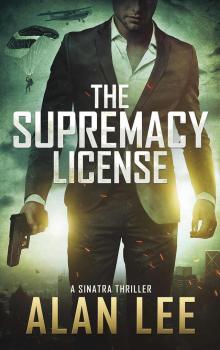 The Supremacy License
The Supremacy License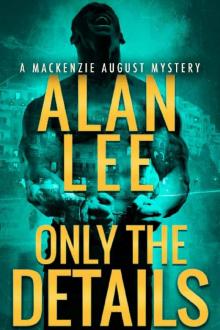 Only the Details
Only the Details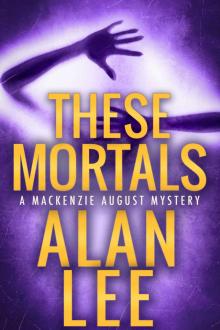 These Mortals
These Mortals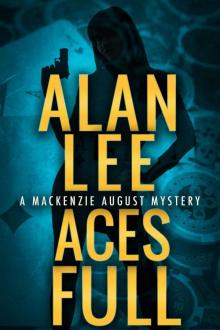 Aces Full
Aces Full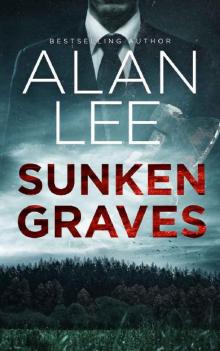 Sunken Graves
Sunken Graves Mackenzie August Boxset 2
Mackenzie August Boxset 2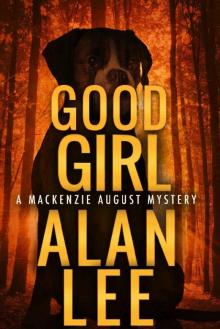 Good Girl
Good Girl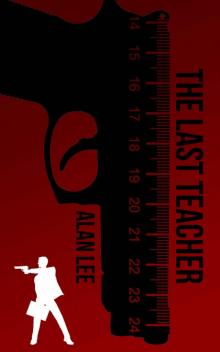 The Last Teacher
The Last Teacher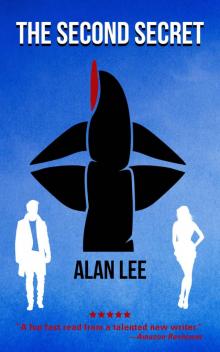 The Second Secret (Mackenzie August Book 2)
The Second Secret (Mackenzie August Book 2)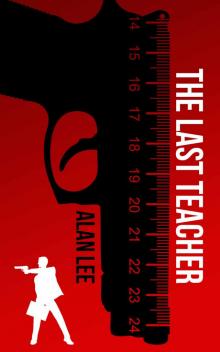 The Last Teacher: A Stand-Alone Mackenzie Mystery
The Last Teacher: A Stand-Alone Mackenzie Mystery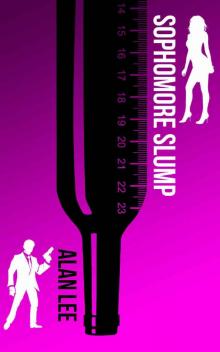 Sophomore Slump
Sophomore Slump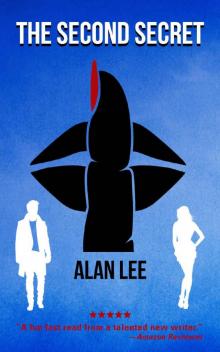 The Second Secret
The Second Secret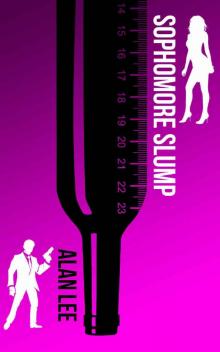 Sophomore Slump (Mackenzie August Book 1)
Sophomore Slump (Mackenzie August Book 1) Tales From the Perilous Realm
Tales From the Perilous Realm